Why My Pigeon Eggs Not Hatching?
One of the greatest joys of keeping pigeons as pets is to see them grow and eventually become parents. But in the journey of them becoming parents, you might go through the most stressful situation for them. Not seeing the eggs hatch.
Infertility is one of the most common reasons pigeon eggs may not hatch. It can happen when the male or the female is too young or old to breed. Nutrition and environmental factors also play a role.
Keep reading if you are still asking yourself why is my pigeon eggs not hatching, and you want a comprehensive understanding of the topic.
Want to learn more about pigeon habits:
How Long Does It Take for Pigeon Eggs to Hatch?
The natural incubation period for pigeon eggs is generally 18 days. However, sometimes, the eggs can take up to 21 days to hatch. There’s also an artificial incubation process, which can shorten the incubation period from 0.5 days to 1 day.
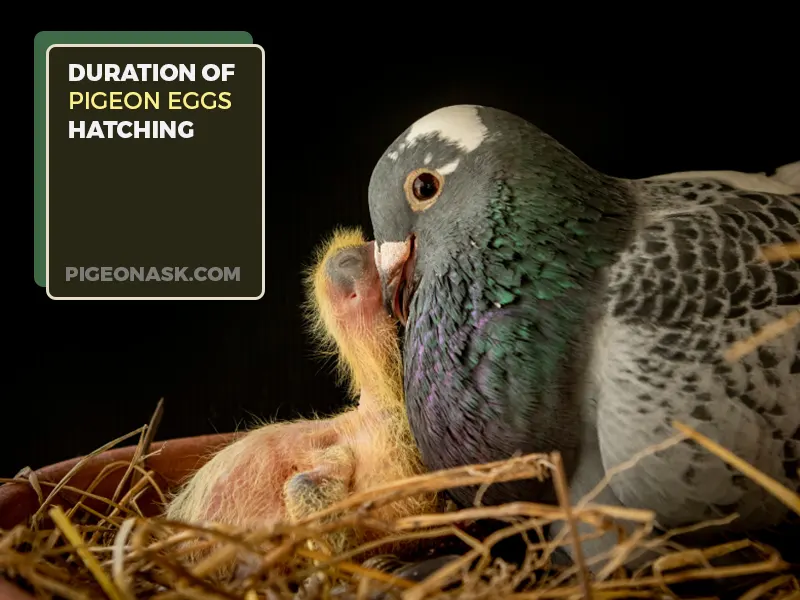
In the artificial process, you basically have to play with the humidity and temperature level of the environment. Finding a suitable range will enable you to make the eggs hatch faster.
Nonetheless, the main point is that it is generally a thing to worry about if the eggs are not hatching after 21 days. Usually, pigeon eggs do not take longer than that to hatch.
Learn about pigeon lifestyle in “Pigeon Habits” . We cover their eating, nesting, and interactions with humans.
Do I Need to Keep the Eggs at a Consistent Temperature?
For the eggs to hatch successfully, they need to be at a consistent temperature. Any sudden change in temperature can lower the chances of the eggs hatching. But what should be the temperature of the eggs?
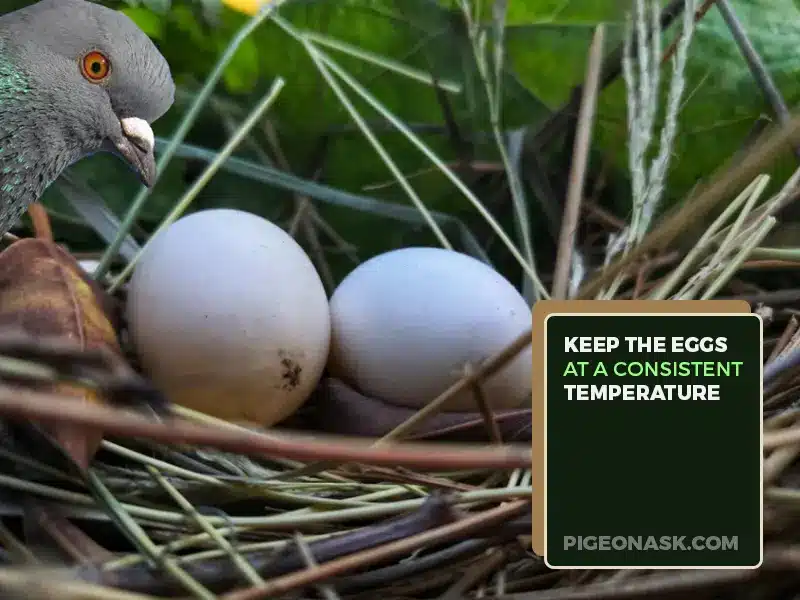
During the natural incubation process, the eggs remain a few degrees lower than the average body temperature of the bird. For most birds, the optimum temperature for the eggs is 98.6 degrees F, which translates to 37 degrees C.
Now, as you can see, the optimum temperature for the bird eggs is roughly the same as the average temperature of humans.
How Does Temperature Impact Incubation?
Temperature is a critical factor for incubation. It directly impacts the egg-hatching process. To be exact, the temperature plays a role in the development of the pigeon embryo inside the egg.
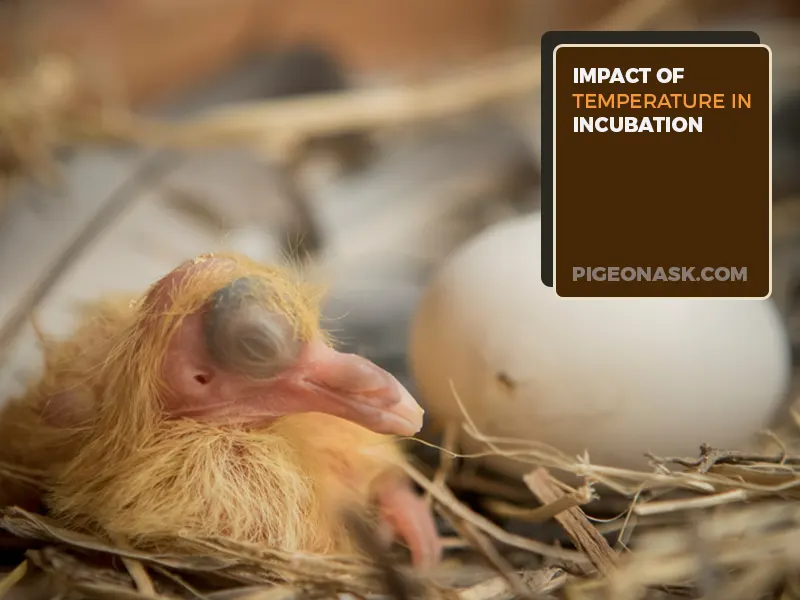
When the temperature starts to fluctuate too much, there will be a negative impact on the embryo’s development. The same thing applies when the temperature is too low or too high.
In fact, if the temperature is not constant, there can be developmental problems after birth. That is if the bird does make it out of the egg. In most cases, the embryo will die from not getting the optimum temperature.
What Are the Common Causes of Unhatched Eggs?
So, there are many different reasons why the eggs may not hatch. Yes, it is not just the temperature. You will get a deeper understanding of all of them by reading the info below:
Infertility of the Birds
Among all, the one that mostly causes the eggs to not hatch is infertility. And for pigeons, infertility is generally associated with age. Pigeons reach sexual maturity as early as 7 months of age.
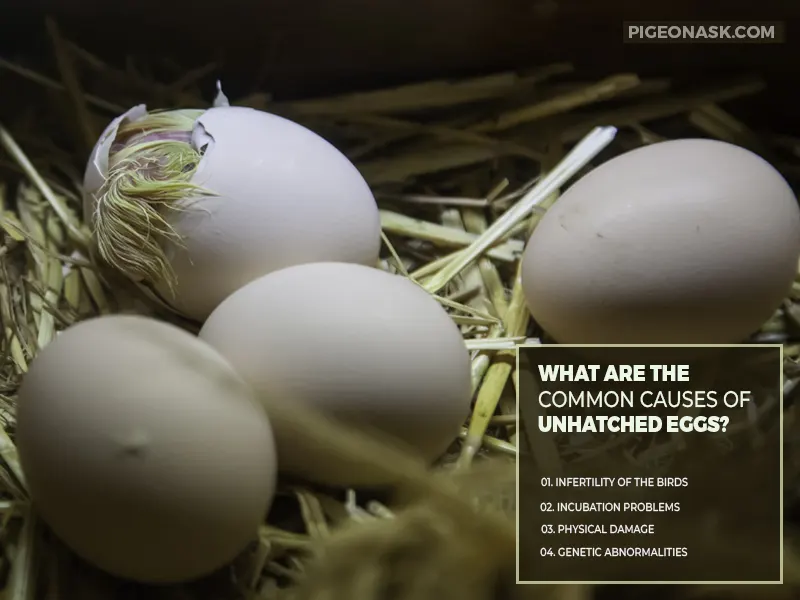
On the other hand, pigeons can stay fertile for up to 10 years. However, they will notice a decline in fertility after age 5 or 6 years.
Incubation Problems
Other than the fertility problem, there can be incubation issues. And as discussed earlier, the temperature is one major factor in this regard. Temperature levels above or below the optimum level will cause the eggs to not hatch.
Likewise, the humidity levels should be at the optimum range too. The optimum humidity range for natural incubation is from 55% to 60%. Anything higher or lower than this range will make the embryos die.
Physical Damage
Intentionally or unintentionally, the eggs can get physically damaged during incubation. It can happen while you are handling the eggs or the birds moving around. And any physical damage will prevent the embryo from developing.
Genetic Abnormalities
Sometimes, the eggs may not hatch even with everything in the right order. In such cases, you can generally blame genetic abnormalities within the embryo. This factor is not on your hands, and it is not the fault of the birds either.
How Can You Tell If Pigeon Eggs Are Alive?
There are different ways to judge whether a pigeon egg will hatch or not. Some of the effective methods are described below:
Looking for Veins
Otherwise known as candling, you can hold the egg to a bright light to see whether there are signs of life inside. You should see veins or even visible movements inside the egg. However, do not hold the egg to the light for too long.
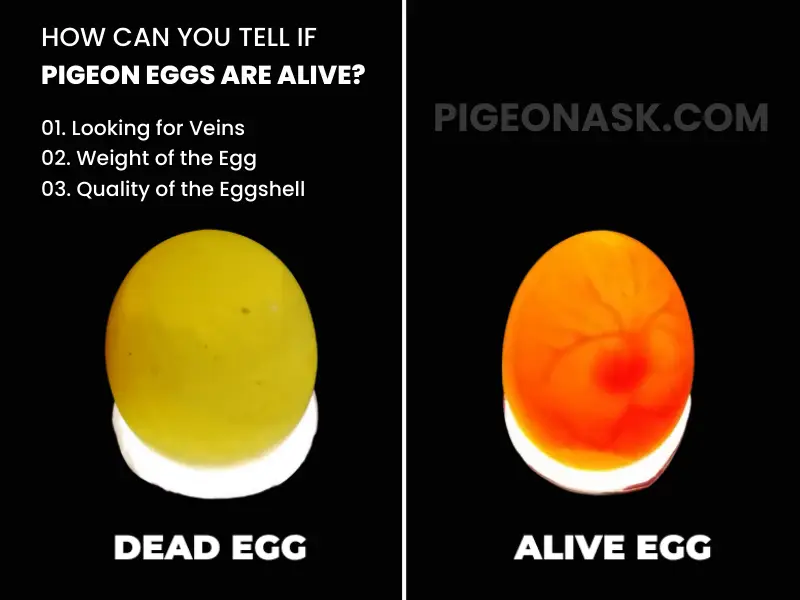
Weight of the Egg
Another way to judge whether the egg is still alive or not would be to check its weight. As the embryo inside the egg grows, the egg gains weight. During the time of laying, the eggs will be anywhere from 14.80 grams to 25 grams.
Take note of the weight when the birds lay them and then use that number to compare afterward.
Quality of the Eggshell
Still can’t dictate whether the egg is alive? See whether you can see any weak spots on the egg. There can also be visible cracks, which will indicate that the embryo inside is dead.
What Happens If an Egg Doesn’t Hatch?
A pigeon egg that does not hatch is also known as a non-viable egg. In natural settings, the birds will eventually remove the non-viable eggs after a certain period. The longer it stays in the nest, the more it decomposes and spreads a foul odor.
Sometimes, the pigeons might not remove it and keep the non-viable egg inside the nest. In such cases, you should remove the egg. This will help to prevent the spread of diseases and improve the overall health of the breeding pair.
Final Words
Are you still wondering why is my pigeon eggs not hatching? In short, temperature, humidity, and the fertility of the birds play a crucial role in eggs.
And as you now know the techniques of judging an egg, it should be easy to conclude whether the egg is living or dead.
With that said, we hope that you found this post helpful. If you want to support and help us provide more content such as this one, please consider connecting with our Facebook, Twitter, and Pinterest accounts.
References:
- https://kidadl.com/facts/pigeon-eggs-why-do-pigeons-abandon-them-when-do-they-hatch-and-more
- https://beautyofbirds.com/eggs-not-hatching/
- http://www.melbournebirdvet.com/artificial-incubation-and-hand-raising
Images Credit:
- Canva.com/photos
